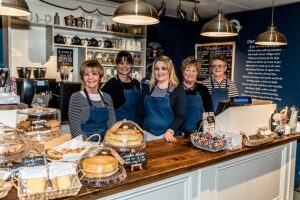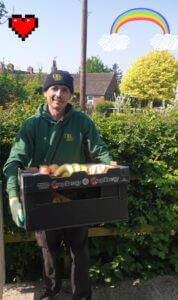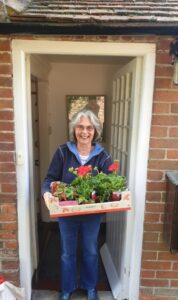
Keeping it local at the Chilterns’ community shops
Chilterns volunteer Joe Stewart explores the role that non-profit, volunteer-run community shops play in the Chilterns – including the lifeline they are providing during lockdown…
As our lives have become far more limited under lockdown, we have all been staying home – and staying local – a great deal more. With most shops closed and businesses shuttered, we have become much more aware of and grateful for those that remain open, keeping us fed, watered and stocked. For most people in larger towns or cities, the lockdown has still meant supermarket shopping, albeit under slightly different circumstances. Queues, sanitation stations and winding routes around the aisles are now commonplace.

For those in rural communities, though, the lockdown has thrown up a set of unique challenges. Travelling to go shopping may be allowed, but the idea of a 10-mile or more round-trip to buy essentials is neither an appealing nor particularly responsible prospect. Compounding this problem is that many rural communities have older populations than urban centres, with vulnerable individuals told to self-isolate or minimise their social contact. Many rural communities have lost their village shops due to the growth of out-of-town superstores and on-line shopping. In the Chilterns many former shops have now turned into residential homes for the sizeable commuting population. This can make it challenging for those without cars or internet to access food and goods (mostly the elderly), whilst depriving everyone of a community hub.
Taking action
The last decade has seen increased demand for local produce and villagers have sought new ways to bring together their communities. Coupled with a wave of village shop closures, which the Plunkett Foundation estimates to be in the region of 300-400 per year across the UK, enterprising local people have decided it is time to take action.
 The result has been a wave of ‘community shops’ – small, not-for-profit ventures established, run and maintained by and for the local community. Community shops tend to be owned by local members, overseen by a board of directors, and operated day-to-day by a manager with a team of volunteer staff. They are funded by grants, community fundraising activities and donations, and all operational profits are put back into the shop.
The result has been a wave of ‘community shops’ – small, not-for-profit ventures established, run and maintained by and for the local community. Community shops tend to be owned by local members, overseen by a board of directors, and operated day-to-day by a manager with a team of volunteer staff. They are funded by grants, community fundraising activities and donations, and all operational profits are put back into the shop.

Photo: Hughenden Valley community shop & cafe
Such shops come in a variety of shapes and sizes, ranging from shipping containers to village halls. All stock essentials and groceries – often sourced locally – and many carry luxuries including local beers, wines and spirits, gift items and magazines. Some community shops also act as cafés, meeting places and event spaces, and the majority offer a post office service. They are rare examples of spaces that are both practical and enjoyable, enhancing village life by promoting togetherness.

The Chilterns boasts 10 community shops in total covering the length and breadth of the region: South Stoke Community Shop and Ewelme Village Stores in Oxfordshire; Lacey Green Community Shop, Hughenden Valley Community Shop, Jordans Village Community Store, Hyde Heath Village Shop and The Lee Shop in Buckinghamshire; and Sarratt Post Office Stores, Wigginton Village Shop and Wilstone Village Shop in Hertfordshire.
A shop for South Stoke
Of these shops, South Stoke Community Shop – housed in two converted shipping containers on the recreation ground of the small Thameside village of South Stoke – is one of the more remote. The village used to have a longstanding shop but, in a familiar tale, it closed in 2000 and was redeveloped for residential use. As the 00s progressed the desire for a replacement grew, reaching a high point with the 2011 Village Plan in which a survey identified a village shop as the number one priority for villagers. A committee of local people was set up to start investigating the prospect of establishing a community shop, with support and guidance provided by the Oxford Rural Communities Council.
Fast-forward to 2013 – following much research at other local community shops, committed fundraising, and a crane – and the shop was open for business, granting residents their wish for the much-needed service. With the support of its 40-person volunteer team and nine-person committee, the shop has gone from strength to strength over the past seven years.
Making a community
 The shop and its volunteers are managed by the committed Jules Costello, who joined after a stint at Brightwell-cum-Sotwell Community Village Store following a career working for British Airways. Admitting that she had “her arm twisted” to volunteer in the Brightwell-cum-Sotwell shop to cover a maternity leave position, Jules soon came to “absolutely love” the unique experience of working in a community shop. Despite having lived in the village for 20 years, she says, “I mainly knew one demographic in the village, the mums. But working in the village shop I got to know so many people that I didn’t before because they were a different demographic.” This included the many willing volunteers, often retirees who had the time and inclination to help. Now working at South Stoke Community Shop, Jules highlights the shop’s mission of “going the extra mile for people.” This means getting to know shoppers on a personal level in a way that used to be the norm. As Jules says of the shop’s regular customers, “I’ve got it in my head who wants what, and when it comes in I can let them know.” Indeed, many customers set up accounts at the till, giving Jules and the volunteers an idea of their buying habits and needs.
The shop and its volunteers are managed by the committed Jules Costello, who joined after a stint at Brightwell-cum-Sotwell Community Village Store following a career working for British Airways. Admitting that she had “her arm twisted” to volunteer in the Brightwell-cum-Sotwell shop to cover a maternity leave position, Jules soon came to “absolutely love” the unique experience of working in a community shop. Despite having lived in the village for 20 years, she says, “I mainly knew one demographic in the village, the mums. But working in the village shop I got to know so many people that I didn’t before because they were a different demographic.” This included the many willing volunteers, often retirees who had the time and inclination to help. Now working at South Stoke Community Shop, Jules highlights the shop’s mission of “going the extra mile for people.” This means getting to know shoppers on a personal level in a way that used to be the norm. As Jules says of the shop’s regular customers, “I’ve got it in my head who wants what, and when it comes in I can let them know.” Indeed, many customers set up accounts at the till, giving Jules and the volunteers an idea of their buying habits and needs.

The other important aspect of the shop, according to Jules, is “keeping it a real community hub.” This means having real conversations with customers and looking out for them, particularly older residents who may otherwise be at risk of loneliness. It also means running events and activities, often in tandem with the pub and village hall, to bring the village together – as well as providing some much needed income. “We’ve done things like pizza nights, cinema evenings in the village hall, walks with lunch after, and fashion shows,” says Jules. “The bar is stocked by the shop, the food is from the shop.”
Rising above lockdown

Unfortunately, lockdown has seen this summer’s events called off. Thankfully, though, the shop has been coping well, with takings up since restrictions came in place. Jules attributes this to the desire, and in some cases the necessity, to stay local: “The old-fashioned way of using your village shop has come to the fore [during lockdown]. A lot of people in the early days were struggling to get deliveries from big supermarkets, but we have really good relationships with our suppliers and can get fresh fruit and veg every day. We can get hold of pretty much anything with enough notice.”
To reach people in the village who may be self-isolating, the shop’s volunteers have been running a safe, door-to-door drop-off service. For some, this has offered a lifeline in these difficult times. “Carers have said they don’t know what they would have done without the shop,” Jules recalls, as they are unable to leave those they support to buy supplies.
Adjustments have had to be made to accommodate social distancing and cope with reduced volunteer numbers, given that many are of retirement age. This has included limiting hours, only allowing one person in the shop at a time, and installing a screen around the till to protect the cashier.
However, Jules remains upbeat: “It’s been a challenge, but I’ve enjoyed the challenge. Here, and especially at the moment, people come just for a chat. Taking the dog out and popping into the shop may be as much as they’re doing in a day.” Under such unsettling circumstances, community shops have a greater opportunity than ever before to support the health and happiness of their communities, with many going above and beyond. For instance, volunteers at South Stoke are creating face coverings in aid of vaccine researchers at the University of Oxford.
Looking forward, the hope is to eventually trade up South Stoke’s shipping containers for a dedicated building, “maybe with a café,” says Jules. But no matter what community shops look like, it is clear that their hearts lie in the volunteers that run them and the communities that rally behind them. By giving a little, you receive a lot in return.
Related news
Bluebells: the sign of spring in the Chilterns
Bluebells flower in abundance in ancient woodland in early spring and are found throughout the Chilterns.
An update on our management plan
We are legally required to produce a new or updated management plan to replace the existing one by the end of March 2025.
Calling all artists: new national arts programme
We are seeking writers and artists to take part in Nature Calling – a new national arts programme.





